I wrote this week about a weird old hobby of mine:
When I lived by the river in London, I used to go mudlarking – a bit obsessively – along the Thames foreshore.
Mudlarking is kind of amateur archaeology, basically looking for cool things in the mud and pebbles along the riverbank. The detritus of 2,000 years since Roman ‘Londinium’ is plastered in the mud; things that people dropped centuries ago, off boats, off jetties, intentionally or accidentally, getting into boats fleeing the Great Fire of London in 1666. Romans, Saxons, Tudors, Victorians, you name it.
From my mudlarking days, I have a very impressive collection of pottery through the ages, countless clay pipes (the cigarettes of former times) — and even an ammonite fossil.
This is all true.
Years ago, I lived in Wapping and then Rotherhithe with my husband and young son.
Wapping is a gentle curve and Rotherhithe a sharp spur of land that stick out into the Thames in east London, before the great bend at Limehouse, around the Isle of Dogs down to Greenwich.
I took up mudlarking — with one eye on the past — when I saw the end of my marriage approaching.
At the time, I worked long hours and had a small child. Those places had the inestimable value of being close to work. I used to walk down the river each morning — and, in the evening, ran home to put my son to bed, before returning to the office.
That stretch of river is positively dense with humanity.
Captain Kidd was tarred and feathered here, left to rot and be overcome by the tides. Turner’s mistress ran a public house off Wapping Green. Captain Cook married a local girl.
Beyond the lights of Tower Bridge, past the ruins of Edward III’s fourteenth century moated hunting palace, there’s a teetering house next to the Angel pub from which Princess Margaret was reputed to have conducted a steamy affair with a naval officer back in the ‘60s.
Old frigates were dismantled and stripped down here. At low tide, you can walk on carpets of ancient nails that held together keels and hulls.
Once, I found in the mud a bowl, shattered but still intact.
Did some cuckold throw it at his cheating wife, who ducked, so it sailed out the window into the soft mud?
I pulled from the silt as many pieces as I could find — slicing my thumb severely enough to warrant a tetanus booster — and spent hours trying to piece them back together again, in a heroic but ultimately pointless effort at kintsugi.
It’s quiet under the old warehouses now. They’re all multi-million pound flats, owned by bankers.
—
One day, at a pub along the river, I met a man who was having a quiet pint, with an array of clay pipes laid out in front of him.
“What are those?”
“Cigarettes, of the old days.” He told me they’re everywhere, down on the foreshore, because people would chuck them away all the time, like cigarette butts.
As soon as he said that, I couldn’t unsee them. I couldn’t step more than a metre on any city beach without coming up with a handful.
My marriage fell to pieces. I took up mudlarking on that great foreshore, littered with the remnants of thousands of lives.
What is it that Lara Maiklem1 says? Mudlarking is time travel.
Crunching underfoot, you can hear the screams, the crying baby and the shattered crockery with every step. Rare amidst the fragments, perhaps a wedding ring.
It wasn’t just time travel for me; it was invisibility. Mudlarking was a commitment to erasing my significance in the immensity of time. I trawled the Thames foreshore, turning interesting stones, blowing sand from clay pipes. Magpie-ing any bright sherds of pottery, the occasional chunk of Roman amphorae.
Finding old shoes, broken bottles — and, once, this rubber wall-mounted dildo.2
Another day, I turned with my toe an unusually smooth wattled orb — and was greeted with concentric spiral staircase ridges inside.
It was an ammonite. They died out with the dinosaurs 65 million years ago.
Holding it now, it’s still cold and heavy in the hand: bright red where a corner chipped away in the churn at Rotherhithe beach. Half a mile from Tower Bridge, and 65 million years in the tides.
I tramped the foreshore like a woman possessed, tracking the tide and waiting for it to be on the turn, to leave, to be on the way out, always looking to see what was left behind.
The suffering I unleashed?
Two millenia of Londoners and their cares made it seem so paltry.
What was it in the cosmic span of London’s pain.
It wouldn’t last.
—
After that, I lived for a time with the man I left my husband for.
Eventually I left him too.
He told me he joined a Marxist book club, when he realised his own marriage was falling apart. Taking up a hobby was something to do, to fill the hours until middle years.
Eventually it became clear that we had nothing in common — as if “Marxist book club” couldn’t have already told me that.
He spouted gibberish at me one evening in the car about the violence of JK Rowling; called me a TERF when I ventured that maybe it was fair enough to have women-only swim hours in public pools in east London. He, a corporate lawyer, told me I was “complicit” in not yearning for a violent revolution. Castigated me for a lack of idealistic zeal when I said maybe men are more prone to idealistic fervours. That maybe women ultimately care more about protecting our babies than political philosophy.
When he moved out, I packed up all the stuff he’d left behind — and came across his notes from the book club. Neat little black Moleskines: title, author, terse comments. Bullet points and underlines.
Page after pointless page.
I added it to the pile of stuff for him to collect, next to his work folders and bags of protein powder.
—
You may have noticed, I have a bit of an obsession with the things we leave behind.
If I think about the word “leave”, it feels inherently contradictory.
It means leave out, or leave in. It means to take leave, to leave off: to be released. It’s a Janus word, a hydra with two heads facing in opposite directions.
It means leave it behind because it doesn’t matter, or keep it safe because it does (“leave it alone”).
If something’s left, it’s gone — or it’s still there. If I leave something, I get rid of it — or I retain it.
It’s the things that go away, and those that remain.
Like Janus, it’s got one eye on the past — what’s already left — and another on the future — what will be left, and endure.
The reason for this contronymic confusion is that the word “leave” has a confused etymology: it comes from two very different Proto-Indo-European roots, with two very different meanings.
One is ‘leip’: to stick, adhere, continue, persevere.
Joining ‘leip’ (which gave birth to ‘life’ and ‘lively’) and ‘men’ (a root which lives on in ‘immanent’) we get remain. Things that are left are remaining. They continue and persevere.
The other Proto-Indo-European root is ‘sleg’: to be slack or languid, to loosen, to leave off. Things that have left have slackened, shuffled off, gone loose.
They are gone.
—
I lost my sunglasses last weekend in Paris.
They were brand new and not cheap. One minute they were on the table at a wine bar, where we drank with my sister and her family, while the children climbed lamp posts. The next minute I was emerging from the Metro a few stops away, a little bit shit-faced, searching pockets, patting my head and they were gone. They were not, it turned out after a quick call, still on the table at the wine bar. They were not, we discovered, in any of our bags.
They were not, to be clear, on my face — which has happened before, more than once, when I’ve been looking for them.
They were just … gone.
Now, I don’t really care about my sunglasses. They’re just sunglasses. I wore a sun hat instead.
The loss of my sunglasses is not a big deal to anyone, apart from me — and even then, only in the most self-interested navel-gazing kind of way.
But.
As this is an essay about the things we leave behind, and what that means to me, it seems appropriate that I … left something behind.
My sister offered some consolation:
“They weren’t even that nice anyway.”
Like all the unimportant shit we leave behind.
—
While I was in Paris, I read Buried by Professor Alice Roberts, about what we leave behind in graves. Cheerful! It’s a detailed examination of what we can glean from remains: some friable bone shards, a jaw, skull, teeth. Maybe the metal buckle of a long-disintegrated belt or the iron cross-bar of a shield or chest plate.
We all leave behind a bone inventory.
Mandible, clavicle, tibia, fibula — all present and accounted for.
But we are more than a list of things: there’s always a bit more.
Maybe a garden is the thing we leave behind. In the village, one of my friend’s dads did just that: left a garden, full of fruiting trees. An apple tree takes years to fruit. Those trees are forty feet high and laden with fruit. They are venerable.
That is a legacy to leave behind.
Robert Macfarlane wrote — was it in The Wild Places? I can’t remember — about the artist up in Scotland who wanted to entomb a skeleton inside a rock. He wanted to echo an intact human down through the ages.
But that isn’t how it works.
When we go the bits of us that are left get recycled, reused, reimagined. Our bone inventory loosens.
Maybe we are eternalities, with brief excursions in different bodies.
Maybe we are just momentary agglomerations of loosely oiled neurons; pithy monkeys.
—
I gravitate to things — weird things, in unexpected places — and might not know why. Sometimes they feel like a thread that I know but have lost, a long time ago.
It feels hard to pick it back up again in a life, like I only follow it for a short time then lose it and spend the next life trying to pick it back up again.
Like a dream memory, it floats just out of reach.
Certain things strike me uncannily familiar and I can’t explain why. As a child, the placename “Rangoon” held a particular fascination.3 Standing before Starry Night in the Musee d’Orsay last week — an old couple dwarfed by the night sky — I wept like a baby. Sitting on my haunches in the mud of the Thames, I can hear whispers of past footfalls and old grievances. Can I tell you why? No, because I don’t know.
Why do certain things hit? I have no idea.
I have no idea why I like a spritely pixie wood-elf kind of chap with high cheekbones.
Maybe my particles know. The first time I held Joel, my particles sang.
Maybe my particles remembered his particles.
—
Breath, diesel, skin cells.
These are some of the things friends and I mused might be stuck to those beams above our heads in Gare du Nord train station last weekend in Paris.
Remember those beams? Here’s a new picture if you can’t recall:
Most of us leave nothing behind but this: some fumes and dust adhered to the metal frameworks of the Gare du Nord.
—
My line manager told me she qualified as a lawyer in a magic circle firm just before the financial crisis. They sent her on secondment to one of the banks in crisis.
She said every day she’d go to the photocopier and there’d be a new CV on it.
Nothing left behind of all those bank employees in 2008 — except CVs on printers.
—
Back in those days when I lived by the river and spent all my free hours in the Thames mud, I had a job where I had to work on mine financing.
That meant drafting all the finance documents for a company to develop and run a mine. In that case, it was a copper mine in an African jurisdiction.
It’s a matter of public record that I worked on this deal. The law firm I worked for at the time bragged copiously about it in its public-facing literature.
I was a junior lawyer on the deal at that time. There was also a senior lawyer and the partner. I stayed up nights and missed bedtimes and wrote emails during birthday parties.
This particular mine was being refinanced; it had gone through many previous cycles of financings.
Some people joked it was cursed.
About a week after the deal closed, the partner broke his back in a freak accident. The senior broke her leg. And I broke my ankle in a climbing incident I’ve previously described.
Coincidence?
Or a curse from a really angry demi-god somewhere in the sub-Saharan veld?
Who can say.
I left the firm shortly after this. Their next project was going to involve some “green field” development in South America. Green field means brand new. It means taking a green field and making it brown.4 In South America, a “green field” mine project is about the worst kind of egregious offence against the planet you can imagine.
I wanted no part in it.
What I want to leave behind isn’t some gaping wound in the Venezuelan highlands.
I want to leave behind something — bone shards, fumes in Gare du Nord, anything at all — but a brown field.
—
On the way home after Paris, spinning down country lanes, we passed through shafts of light made solid where the dust particles and mist lay heaviest.
In our wake: the liquid motion of a grass verge in the car’s slipstream.
On the bike to the coffee shop this morning, the passage was softer. Unseen animals folded into the hedges at my approach. All I heard was the sound of the folding, like pages, as I passed.
On the school run, I moved gastropods off the road so they didn’t become little sun-baked snail pancakes.
—
These days, I try to be very careful about what I leave behind.
And what I don’t.
—
**Did you spot this was a Cryptic Crossword clue?
Author of the peerless Mudlarking: In search of London’s past along the River Thames.
It may have been silicone. I didn’t get too close.
I lived in Rangoon (now Yangon) for many years. I met my ex-husband there and my son, half-Burmese, was made there. There’s a little bit about that time — and about the things we leave behind — in my piece called Fancy Tuna. But there’s still so much left to talk about.
In lawyer parlance, it is literally called this: a “brown-field” project.




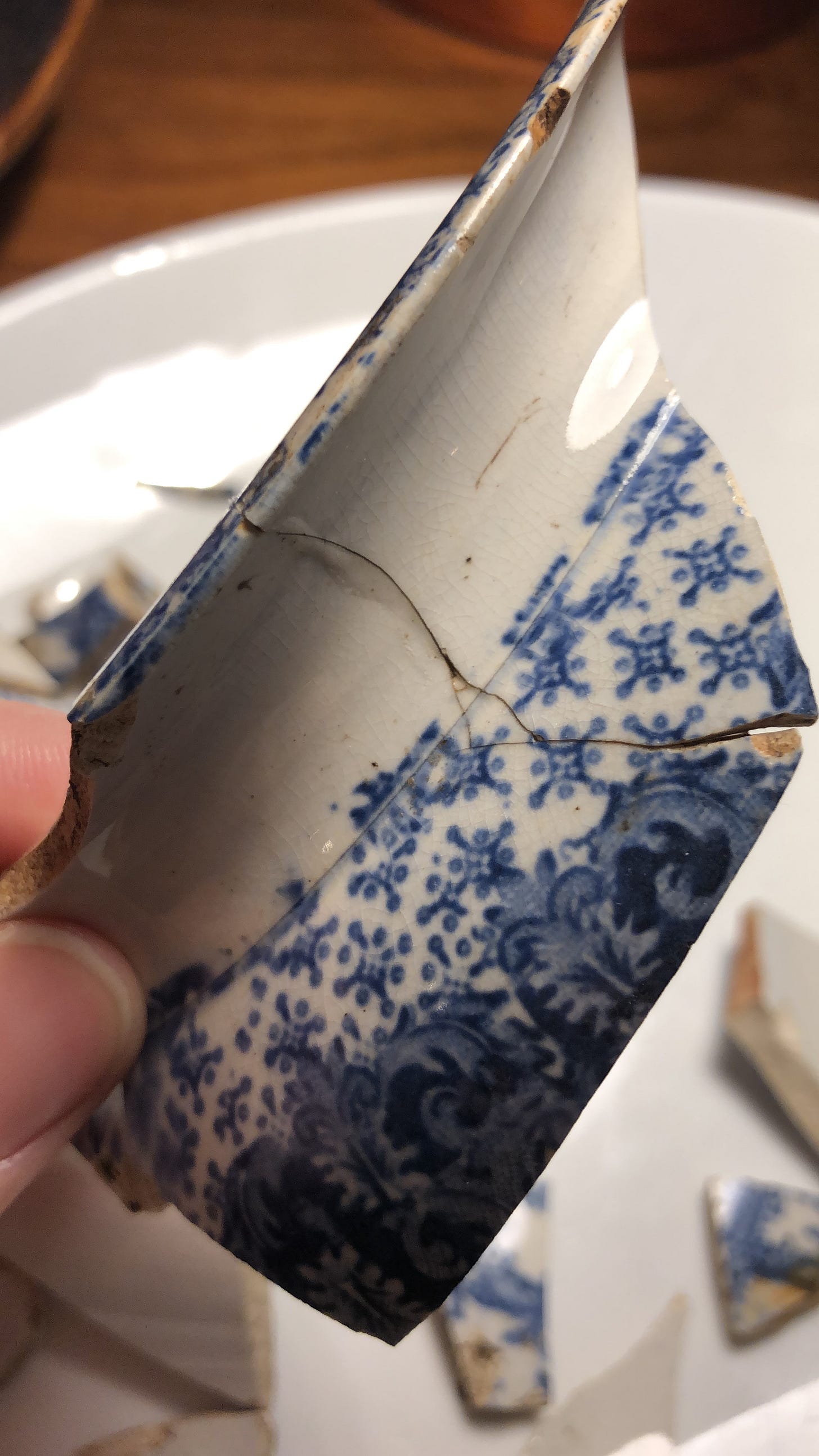

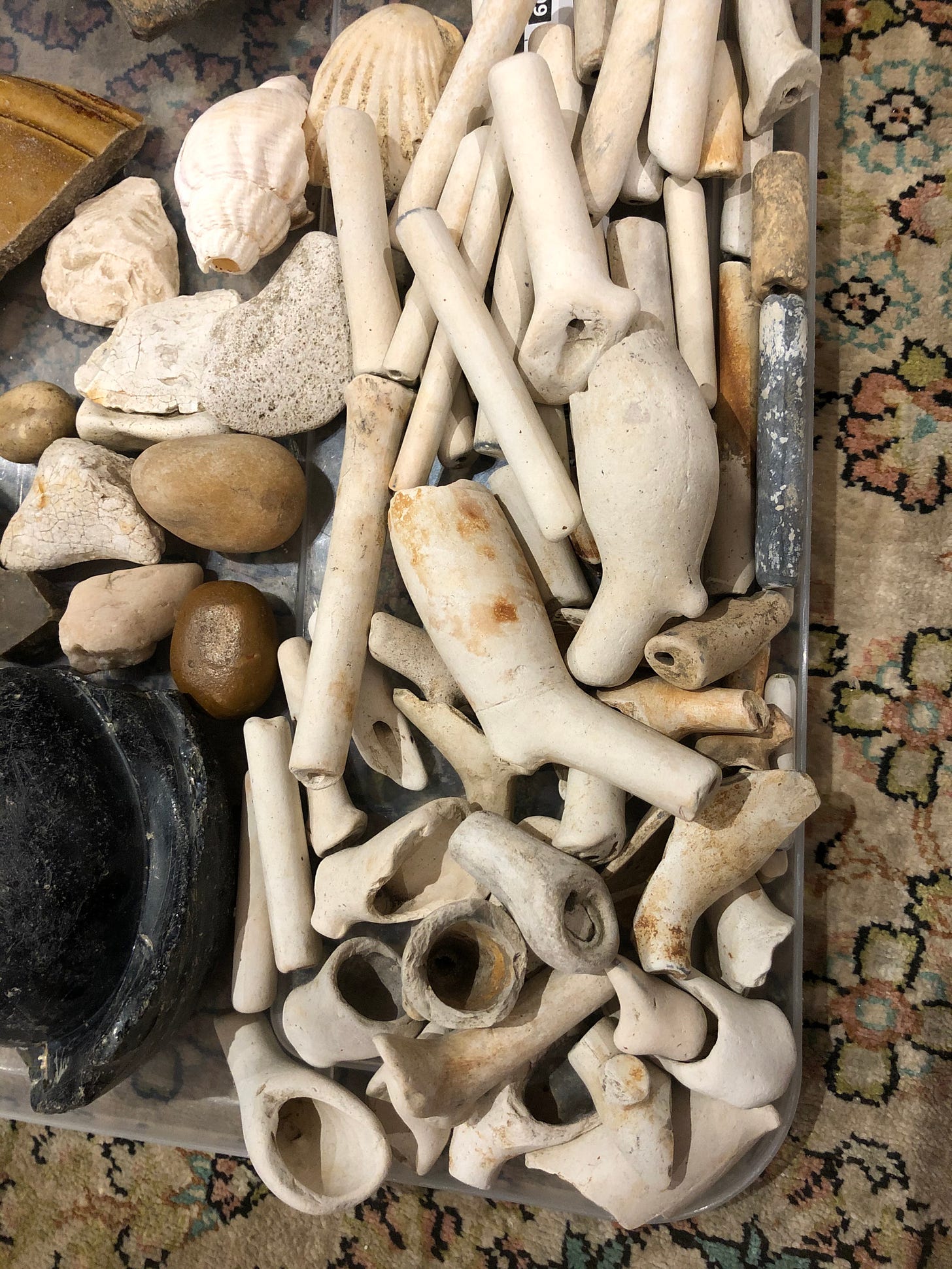
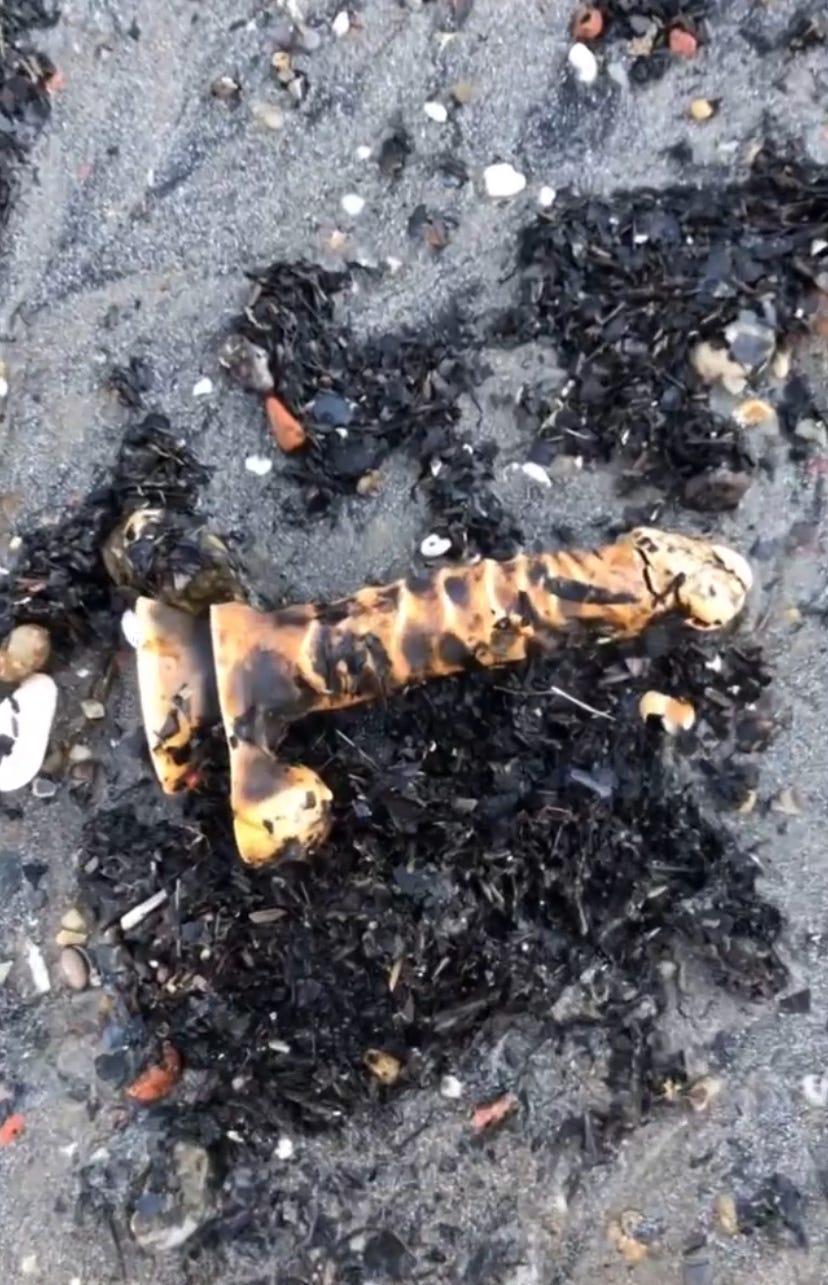
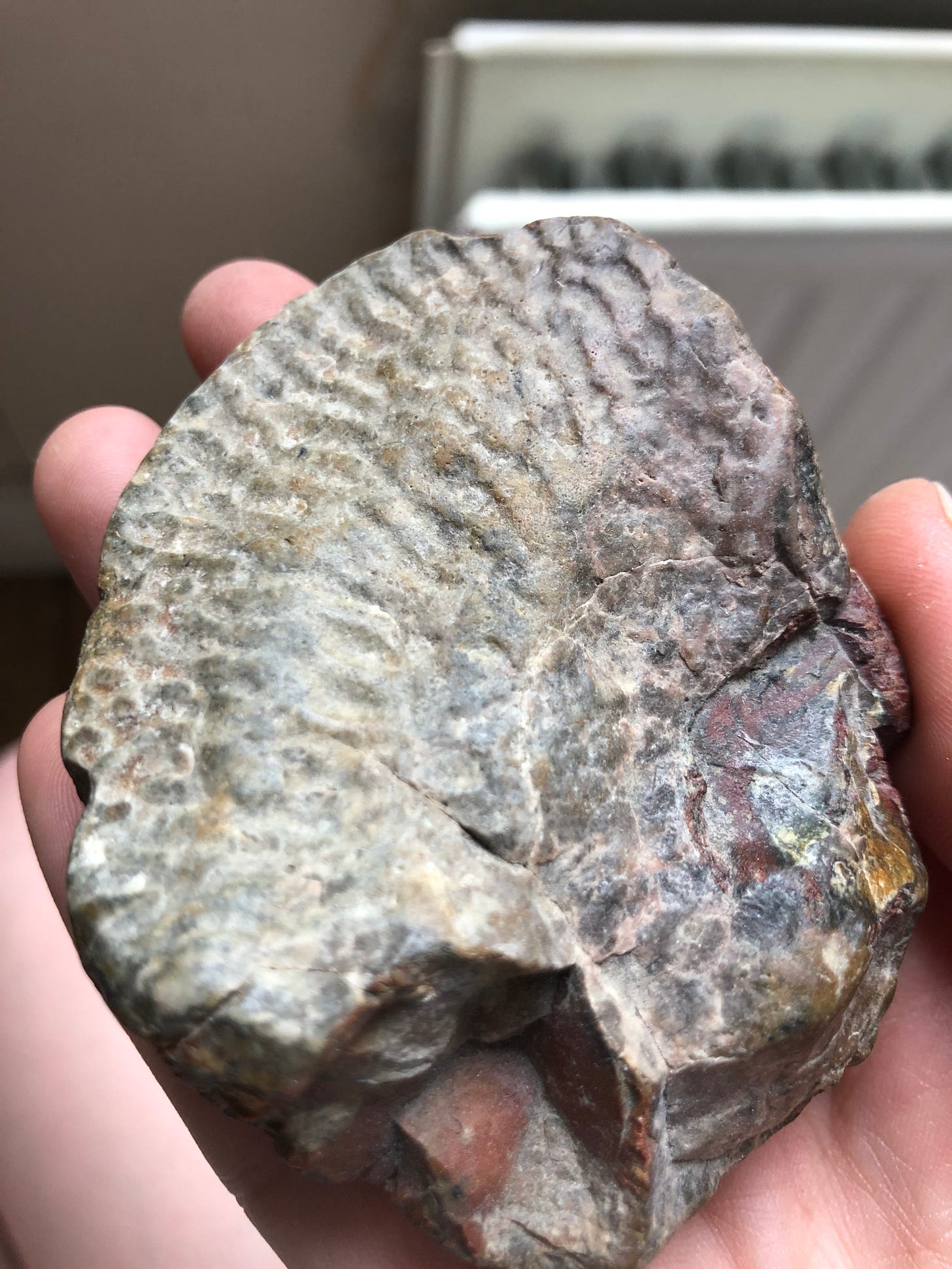
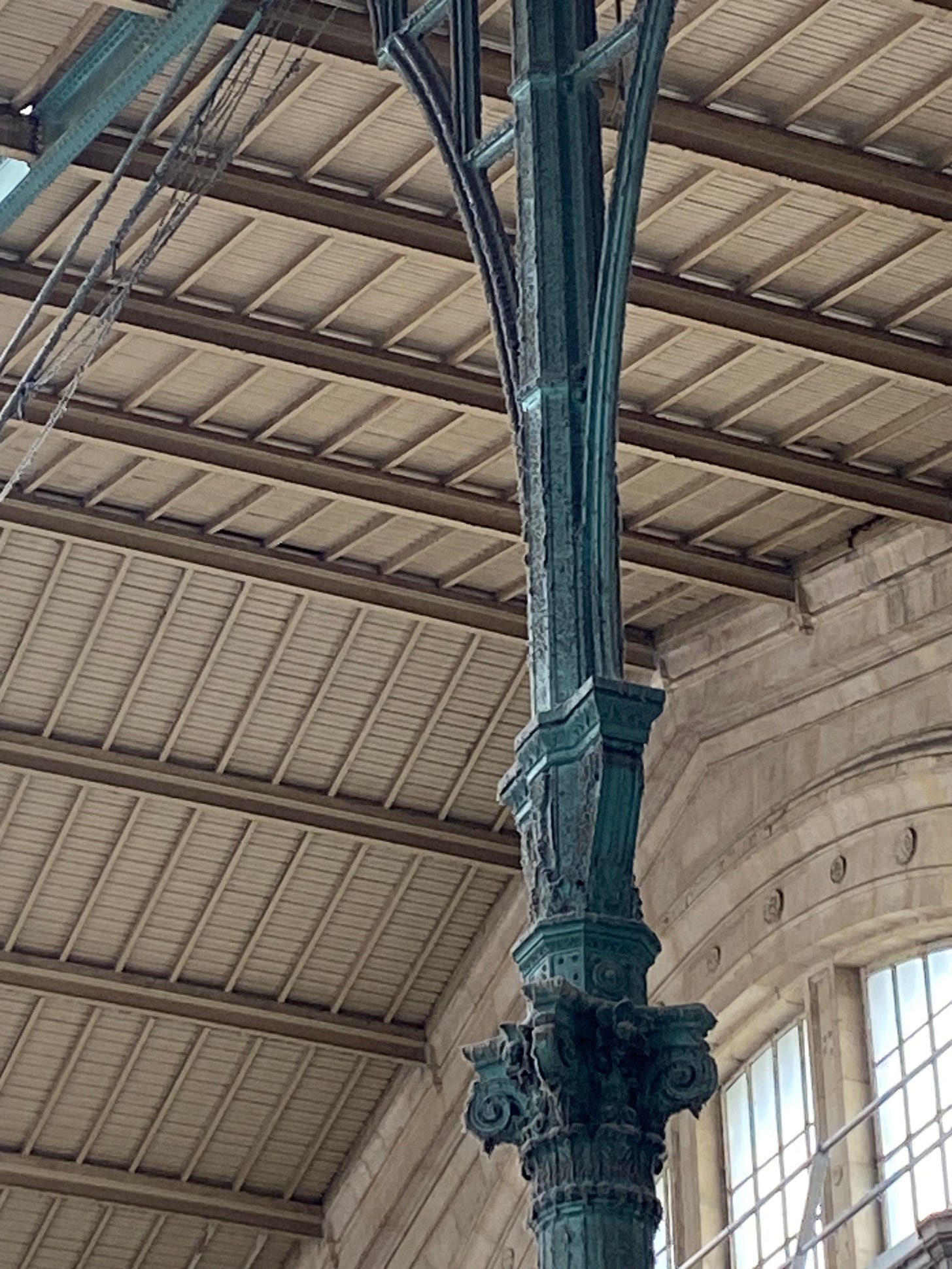

We're just pithy monkeys made of singing particles! Love it!
So THAT'S what all those people were doing, I saw them from the Millennium Bridge and thought "clams? on the banks of the Thames? surely not!" but then a tour guide distracted me talking about the artist that paints pictures on wads of chewing gum in the grate, and my little squirrel mind was off and running... :)